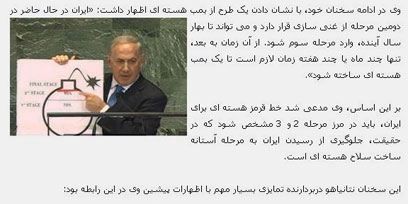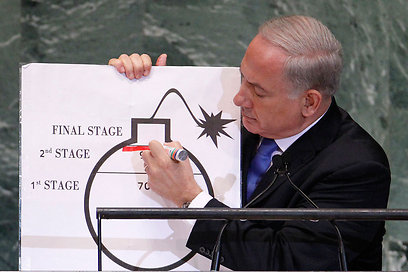Iranian, Arab press slam Netanyahu speech
Iranian news website claims PM pushed back his red line compared to past statements, while Lebanese op-ed says Israeli leader using Iran to sidelines Palestinian issue
Roi Kais, Dudi Cohen
Published 09.28.12-12.28 / Israel News -- Source
Prime Minister Benjamin Netanyahu's dramatic UN speech in which he highlighted the need to draw a "red line" for Iran's nuclear program prompted responses not just in the West, but also in the Arab and Muslim world. While Iranian authorities have yet to officially respond to the speech, media outlets in Iran and the Middle East were quick to offer their own analyses
A popular news website in Iran explained that the Islamic Republic views Netanyahu's speech as a withdrawal from his previous positions on the Iranian nuclear issue. The website Tabnak, affiliated with former Revolutionary Guards commander Mohsen Rezaee, said that the Israeli prime minister had changed his positions on a red line for Iran.
The article claimed that in the past Netanyahu had stressed that a red line was 20% level enrichment of uranium, while his speech placed the line at 90% enrichment

Article in Iranian website

Graphic illustration (Photo: Reuters)
The Arab press also addressed the speech. The London-based al-Quds al-Arabi published a harsh editorial attacking Netanyahu's speech titled "Don't make us choose between Israel and Iran."
Abdel Bari Atwan said, "No one believes the liar speaker and no one skipped a beat over his drawing. Pretending to safeguard peace, security and stability in the region, Netanyahu completely disregarded the Palestinian issue and the only time he mentioned it was when he condemned Abu Mazen's (Mahmoud Abbas) speech – a speech by a weak man seeking public sympathy and explaining his people's suffering in a tedious manner."
Atwan further added, "Netanyahu's speech and his red lines are a call for war or preparation for it at best….we don't need Netanyahu or anyone else to lecture us and the world about the Iranian threat, as the real danger threatening us is the Israeli warheads aimed at our heads."
He concluded the editorial by stating, "When faced with a choice between Netanyahu's aggressive Israel and an Iran that defends itself, its land and its honor, we stand by Iran."
Lebanon's an-Nahar newspaper published an op-ed titled, "Netanyahu, the war preacher."
"Netanyahu has taken advantage of the Iranian threat to prevent any discussion on a peace deal with the Palestinians and effectively prevent such an agreement. Instead of advocating peace at the UN, he called on the international community to wage a new war with his demand for a red line for Iran. But Netanyahu's cries for war will fall on deaf ears as the world does not want to embark on a new military escapade in the region."
'Netanyahu turns to our subconscious'
Imad Abdullah Ayasrah, a Jordanian political analyst, highlighted a different aspect of Netanyahu's speech. "Netanyahu presented us with an obvious psychological speech in which he turns to one's subconscious and transfers the Iranian threat to the ears of the international community. As far as I'm aware, speeches by Arabs rarely rely on psychologists to convey what they want in the simplest way.
"Netanyahu's drawing, with all its simplicity, was prepared by an army of experts and has the clear markings of a message to the subconscious that Iran will use the bomb immediately when uranium enrichment hits the 90% mark.
"The speech made the world feel like Iran's nuclear program is of a military nature and the question is not whether Iran will produce a bomb but when will it use it."
"I am not defending Netanyahu but in all fairness his speech is one of the most creative political speeches I have ever heard. This is the power of the media war." He concluded by saying, "We, Israel's enemies, know when its leaders distort reality, but the question is how Israel's allies will respond to these speeches."


